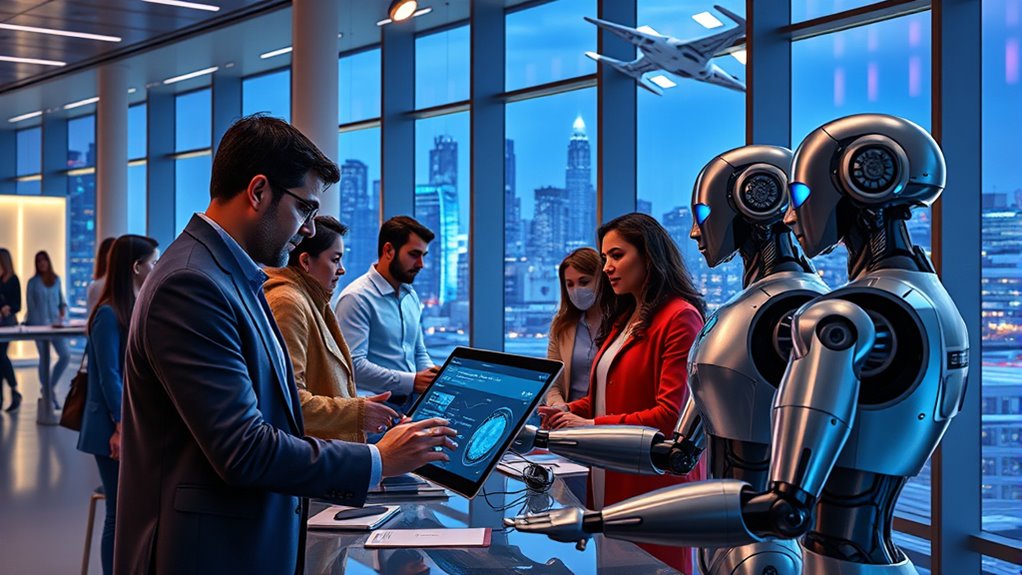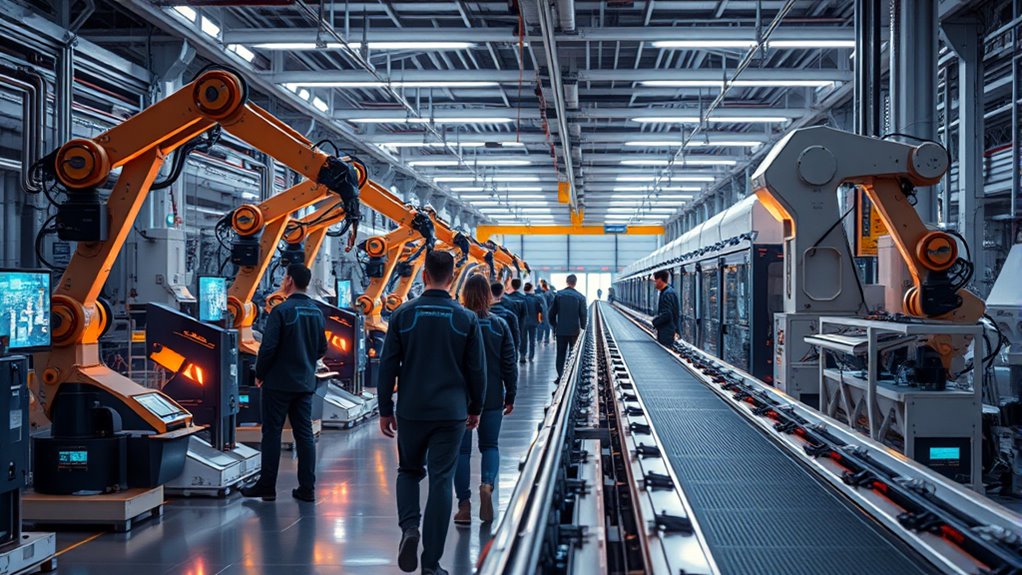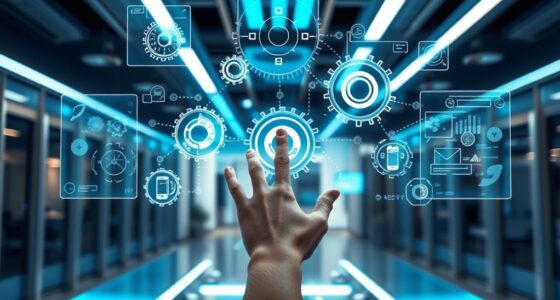The future workforce is shaped by automation, with AI transforming roles, skills, and work environments. You’ll need to adapt by reskilling in areas like creativity, strategic thinking, and collaboration with AI tools. Embracing ethical AI practices will help maintain trust and fairness in the workplace. As automation reshapes jobs, staying proactive and open to change can turn challenges into opportunities. Keep exploring to discover how you can thrive in this evolving landscape.
Key Takeaways
- Automation transforms work by replacing routine tasks, emphasizing strategic, creative, and interpersonal skills.
- Ethical AI practices are vital for fair decision-making and maintaining trust in the workplace.
- Reskilling enables employees to adapt to new roles, focusing on collaboration with AI and data analysis.
- Redefining job roles shifts focus toward higher-value activities and flexibility in responsibilities.
- Successful adaptation requires organizations to foster continuous learning, ethical AI integration, and innovative work environments.

How will automation shape the future workforce? As technology continues to advance, automation is set to revolutionize how you work, creating both opportunities and challenges. You’ll find that AI and machine learning tools are increasingly handling tasks once performed by humans, which means you need to evaluate the implications around AI ethics. Ensuring that these systems make fair, unbiased decisions is critical, not just for compliance but also for maintaining trust in the workplace. If you overlook ethical considerations, you risk fostering discrimination or unfair treatment, which could damage your organization’s reputation and employee morale. Recognizing the importance of AI ethics isn’t just a moral obligation; it’s a strategic move that will influence how successfully your organization adapts to this new era.
Prioritize AI ethics to ensure fair decisions, build trust, and support your organization’s successful adaptation to automation.
As automation grows, workforce reskilling becomes essential. You’ll likely need to learn new skills and adapt to roles that are more strategic, creative, or interpersonal—areas where humans still outperform machines. Reskilling isn’t just about acquiring technical knowledge; it’s about developing a mindset open to continuous learning. Employers will look for people who can work alongside AI systems, interpret data insights, and make nuanced decisions. For you, this means embracing change proactively, seeking out training programs, and staying curious about emerging technologies. Reskilling also helps prevent job displacement, giving you the confidence that you can remain relevant in an evolving job market. It’s a two-way street: organizations need to invest in training, and individuals need to take responsibility for their ongoing development.
Automation will also redefine job roles, shifting the focus from routine tasks to higher-value activities. You’ll find yourself collaborating more with AI tools, interpreting their outputs, and applying human judgment where machines fall short. This transition demands flexibility and a willingness to step into new responsibilities. Organizations that prioritize workforce reskilling and ethical AI practices will have a competitive advantage. They’ll attract and retain talent by fostering a culture of innovation and responsibility. Meanwhile, you should view automation as an opportunity to enhance your skills rather than a threat. By understanding AI ethics and investing in your professional growth, you position yourself to thrive in the future workforce.
Ultimately, the future of work hinges on how well you adapt to these technological changes. Automation isn’t just replacing jobs; it’s reshaping the entire landscape. Embracing workforce reskilling and prioritizing AI ethics will be your best strategies for staying relevant. The more you engage with these concepts now, the better prepared you’ll be to navigate the evolving workplace—turning automation from a challenge into a catalyst for your career growth. Additionally, understanding how home improvement principles like organization and decluttering can help create a productive environment for continuous learning and adaptation at work.
Frequently Asked Questions
How Will Automation Affect Global Income Inequality?
Automation will likely widen income disparity and increase economic polarization. As technology replaces jobs, you might find higher-income individuals benefiting from new opportunities, while lower-income workers face job insecurity. This shift could deepen economic divides, making it harder for some to access resources and upward mobility. To address this, you’ll need policies that promote equitable growth and support displaced workers, ensuring automation benefits everyone, not just the wealthy.
What Skills Will Be Most Valuable in Future Workplaces?
Oh, you’ll love this—your future skills are basically a mix of being a digital superhero and a human lie detector. Master digital literacy to navigate complex tech, and boost emotional intelligence to connect authentically with others. These skills will make you irreplaceable in workplaces, where AI handles the boring stuff and humans manage nuance, empathy, and creativity. So, stay sharp, stay human, and keep evolving—because the robots can’t do everything.
How Can Workers Adapt to Rapid Technological Changes?
You can adapt to rapid technological changes by embracing reskilling initiatives and committing to lifelong learning. Stay curious and proactive by regularly updating your skills through online courses, workshops, or training programs. Networking with industry peers and seeking feedback helps you stay current. Flexibility and a growth mindset are essential, enabling you to navigate new tools and workflows confidently and remain valuable in the evolving workplace.
What Role Will Government Policies Play in Workforce Automation?
Think of government policies as the compass guiding workforce automation. Your government will shape this journey through regulation and policy incentives, ensuring technology advances benefit everyone. By setting clear rules and encouraging innovation, they help workers adapt and thrive amidst change. These policies act as guardrails, preventing disruptions while fueling growth. Ultimately, your government’s role is to create a balanced path where automation elevates opportunities, not diminishes them.
Will Automation Lead to a Universal Basic Income?
Automation might lead to discussions about universal income to address job displacement. As machines take over tasks, governments could implement universal income to support those whose jobs are lost. You’ll see debates on whether a basic income can provide financial stability amid widespread automation. While some believe it’s a solution, others worry it might not fully replace the income from traditional employment, making policy decisions vital.
Conclusion
As you navigate the future workforce, remember that automation is a tool, not a threat. Embrace change and keep learning, for the future favors the prepared. Just like a river finds its way around rocks, you can adapt and thrive amid technological shifts. Staying flexible and open-minded will help you turn challenges into opportunities. After all, smooth seas never made skillful sailors—your journey depends on how you steer through these exciting times.









